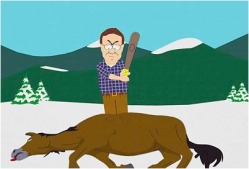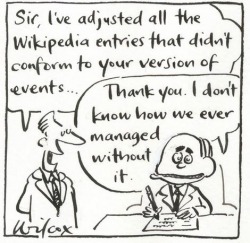I've just finished reading, finally, a very long chapter in Axel Bruns book, Blogs, Wikipedia, Second Life, and Beyond, entitled "Wikipedia: Representations of Knowledge." First, let me say that I chose the comic above, perhaps a negative view of Wikipedia, on purpose. Not because this is what I think of it, but because I believe many do.
I learned a lot about Wikipedia in this chapter: about how it fits the produsage model and about how it differs from traditional encyclopedias (much the same way that citizen journalism differs from traditional journalism). And I could go on about that for at least half a page, but that is not what really caught my attention, and if you been reading about produsage in this blog for a while, then you too can figure out how Wikipedia fits this model.
What caught my attention was when Bruns quotes [b]oyd as arguing that "'many librarians, teachers and academics fear Wikipedia (not dislike it) because it is not properly understood, not simply because it challenges their privilege, just as most new systems and media are feared by traditionalists of all sorts'" (130). Amen brother. Bruns then points out that "it is incumbent on teachers and academics to make their students familiar with the inherent shortcomings of any of the research tools and sources they may be tempted to utilize" (132).
I can't tell you how many times I have sat with a group of peers who criticize the fact that students use Wikipedia as a resource at all. We fear what we do not understand, and many do not understand the fact that a community of users can create content and edit it pretty much at will. Are there things that are misrepresented? Hell yes, but aren't there plenty of "facts" in encyclopedias that have been changed over the years? Bruns makes a point of saying that encyclopedias aim to "encapsulate the current state of accepted knowledge" while Wikipedia attempts to present a "representation of knowledge" (103). Put another way, encyclopedias attempt to portray a "universal truth" as determined by "dead white guys" while Wikipedia attempts to represent a living and diverse knowledge.
We are always talking about valuing the knowledge with which our students walk into our classrooms. This knowledge is a living knowledge. It is growing and morphing everyday. Instead of banning the use of Wikipedia, why don't we use it to help them develop critical reading and thinking skills? Why don't we educate them on ways of determining if an entry on the website is reliable? If we are asking them to do research, is it too much to actually "teach" them how to do that research? It's not gonna help them if we just BAN the use of Wikipedia because it sometimes has mistakes. That's like asking you parents "Why" and them telling you because it's bad without ever sitting you down and explaining what exactly is "bad" about it. And not ALL of Wikipedia is "bad." There is actually quite a bit that is good about it. And if they are using it, then we need to help them learn how to use it effectively. Not just tell them they can't because it's BAD!!
 Some writing just feels this way!! This will likely be the shortest blog entry I've written thus far for a chapter of 30 pages. When I ask myself why that might be, it seems pretty obvious. I find Axel Bruns' book Blogs, Wikipedia, Second Life, and Beyond interesting, but thus far repetitive and somewhat boring.
The third chapter, entitled "Open Source Software Development: Probabilistic Eyeballs," discusses the merits of open source software development, and it often does so in terms of how it fits the four key principles of produsage that Bruns lays out in the previous chapter (which, in case you have forgotten, are 1) open participation, communal evaluation; 2) fluid heterarchy, ad hoc meritocracy; 3) unfinished artefacts, continuing process; and 4) common property, individual rewards).
Given those 4 principles, I can easily see how open source software meets those expectations, so I did not really need to read 30 pages of difficult to read long paragraphs of only one or two sentences to convince me of this. To be fair, it is not that I am not on some level enjoying the text (I'd quit reading it if I weren't), but Bruns' style of writing makes it difficult to not just throw up my hands and say "I get it already, and for God's sake, use a period from time to time!!!"
Perhaps the next chapter on news blogs will be better. I still expect that he'll take a simple concept and use page after page to beat it into submission, but at least I'll have a thorough understanding of it once he does?!
Ok, I'm not sure I'm buying into all that Axel Bruns says in chapter 2, "The Key Characteristics of Produsage," in his book Blogs, Wikipedia, Second Life, and Beyond. For instance, he concludes the chapter by arguing that "what may result from this renaissance of information, knowledge, and creative work, collaboratively developed, compiled, and shared under a produsage model, may be a fundamental reconfiguration of our cultural and intellectual life, and thus society and democracy itself" (34). That seems to be quite the claim to make for it to be only the second chapter of the text.
Before I go any further in this blog, I want to note that Bruns writing style is. . . well, I would say along the lines of maybe a Charles Dickens in that the sentences go on forever. One eleven line paragraph (yes, I said paragraph) was one sentence. He tends to punctuate with colons and semicolons rather than periods. Unlike Dickens, whom I find very readable, Bruns text is one you will have to work at. It is also some what repetitive.
Ok, so I'm going to lay out the basic principles of chapter 2 as I understand them. It may be wrong, so if you've read Bruns book, by all means, let me know what you think. Production models since the industrial revolution have been based on the model of production-----distributor-----consumer, where the consumer had no real input into production. The only option consumers have is to buy or not buy, or choose this brand over that brand. The produsage model, however, changes all of this.
Bruns discusses the "collective hive" and how this hive works together to produce AND use the things that are produced. (I just want to clarify here that I'm not a fan of Cyborgs and collectiveness in this sense, I like my individuality. Cyborgs bad, well, except maybe for 7 of 9, but that's another story.) At any rate, people work together to create the artefacts that they then use. Unlike the typical production model, which has a final packaged product, produsage has artefacts because nothing is ever completely finished.
Bruns also goes into the things that have to come together in order for produsage to be successful. One interesting concept is the non-hierarchical order it takes. He actually labels it Ad Hoc Meritocracy. If you make a popular or awesome change to the product, then you gain social status and move up the hierarchy chain based on your merit. If, however, you really screw up the next time, you likely lose some of that social status and move back down. So the hierarchy is always a fluid thing and there is never any one person in charge of the entire project. Everyone has their specialty and that is the area on which they work.
While there is a lot more to this chapter, suffice it to say that I "think" I've captured the essence of it. Will this type of production model, or produsage model, take hold enough to create the changes related at the top of this post? What do you think?
"User-led content 'production' is . . . built on iterative, evolutionary development models in which often very large communities of participants make a number of usually very small, incremental changes to the established knowledge base, thereby enabling a gradual improvement to quality which--under the right conditions--can nonetheless outpace the speed of product development in the conventional, industrial model" (Bruns 1). The "Introduction" to Axel Bruns' Blogs, Wikipedia, Second Life, and Beyond: From Production to Produsage outlines theories on production that became popular at the beginning of the industrial revolution and which have held tight since that time: until now!!
Bruns makes the argument that we can no longer depend on the terms that have dominated since the industrial revolution to describe what is currently going on. Thus, he coins the term produsage, and produser. He says that the term/s "highlights that within the communities which engage in the collaborative creation and extension of information and knowledge that we examine in this book, the role of 'consumer' and even that of 'end user' have long disappeared, and the distinctions between producers and user of content have faded into comparative insignificance" (2). And as for produsers, Bruns believes that "users are always already necessarily also producers of the shared knowledge base, regardless of whether they are aware of this role . . ." (2).
The topic of social networking also comes into play and how it intersects with this concept of produsage. Bruns discusses the advantages that social software gives us, removing real-world limitations, compensating for inadequacies, and creating environments or tool-sets that are useful for collaborative behavior (3).
This should be an interesting text. I am anxious to understand this new type of production of which I believe I play a major part. I will intersperse these reading blogs with other types of reading, however, due to the length of this book. Don't want to burn out on this one.
|


 RSS Feed
RSS Feed

